It’s easy to get overwhelmed by the number of choices educators face when selecting software, apps, or platforms to support a teaching and learning initiative. Vetting these options is a daunting task and many times we don’t even know where to start.
Some of us depend on reviews from local colleagues while others refer to sites with a dedicated catalog of feedback from fellow educators. Once you’ve managed to narrow your choices to a select few products, the next step is to meet with the companies behind each and get a live demo.
This stage is crucial to the decision-making process, and it’s important you get the information you need. There are dozens of questions worth asking -- both directly to the edtech providers and also internally with your own team -- but if I could select just three, here’s what I recommend you consider every time.
QUESTION TO ASK: In what ways does this tool support our learning goals and objectives?
WHEN TO ASK: During an internal conversation
Start with teaching and learning first, then decide which tools you’re evaluating would be helpful in achieving your educational goals. It’s easy to get caught up in the latest shiny and flashy new tool or trend, but one thing we know for certain is that if we don’t create the conditions of inquiry and purpose for learners, even the greatest of edtech tools will fail us.
Most people don’t go to Home Depot, buy tools, and then figure out what they want to build. It’s the same for edtech: tools should be implemented to achieve a larger goal. For example, let’s say one of your goals is to implement standards-based grading -- any edtech tool you consider should then have clear solutions for overcoming common obstacles for implementing standards-based grading.
QUESTION TO ASK: Is this platform capable of delivering on its promised features and functionality?
WHEN TO ASK: During a demo of the product or platform
I’ll never forget a conversation we had with an edtech company while I still worked in the schools. We asked several questions while looking at a slide deck about a platform we were evaluating. For a few of them, the answer we got was something like…
- We’re working on that feature and I’ll be able to show you soon.
- Our platform will have that capability in a couple of months.
- It can’t currently do that, but we’re working on it.
This is when I learned the hard way about what it means to over-promise and under-deliver. Next thing you know, it was over a year before the features we asked about were available on the platform. Before you make any decisions, always ask to see a live demo of a feature if it’s part of your criteria in making a decision. Otherwise, beware of the aforementioned answers.
QUESTION TO ASK: Can we allocate the appropriate amount of time and resources needed for training (the ”how”) and professional development (the ”why”) to ensure this tool supports your initiatives?
WHEN TO ASK: During an internal conversation
I mention training and professional development separately, and that is very intentional. I believe it’s crucial to differentiate between the two. I view training as the “how” — a user manual on devices, software, apps, or websites. “Click here to do ‘x,’” “share a doc by doing ‘y,’” etc. Training is necessary because teachers must know what the tools are, what they’re capable of doing, and how to operate them.
On the other hand, professional development is all about the “why.” It is focused on building the teacher’s capacity to shift away from traditional pedagogical strategies to methods that fully engage students in the learning process.
As much as we believe in our own edtech tool, we recognize that ineffective teaching plus Otus still equals ineffective teaching. To go back to our previous example, if a teacher doesn’t understand the nuances of standards-based grading, the addition of an edtech tool will not support effective teaching and learning.
Edtech tools are a big investment, not just in money but in time and effort. Make sure you're asking the right questions so that you can make an informed choice that will align with your principles and amplify your abilities to achieve positive educational outcomes.
Related Resources
Request a demo!
See exactly how Otus can help your school accelerate student growth and improve student outcomes – all while saving educators time.





